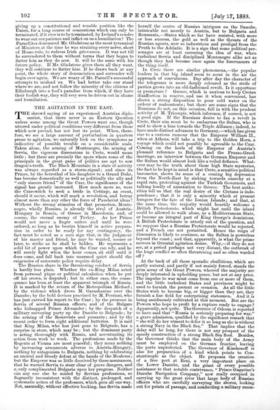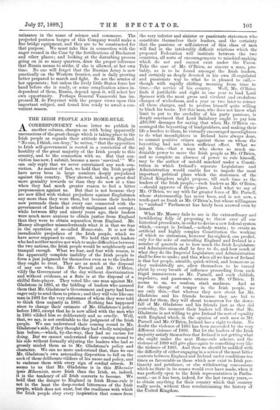THE AGITATION IN THE EAST.
frHE shrewd saying of an experienced Austrian diplo- matist, that there never is an Eastern Question unless some among the Great Powers want one, though uttered under political conditions very different from those which now prevail, has not lost its point. When, there- fore, we see a large amount of perturbation in quarters prone to agitation, we naturally look on the symptoms as indicative of possible trouble on a considerable scale. Taken alone, the arming of Montenegro, the arming of Servia, the vigorous dissensions in Crete, would mean little ; but these are precisely the spots where some of the principals in the great game of politics are apt to sow dragon's-teeth. The Black Mountain in a state of activity was always regarded as a storm-signal; and since its Prince, by the betrothal of his daughter to a Grand Duke, has become domestically as well as politically the ally and "only- sincere friend" of the Czar, the significance of the signal has greatly increased. How much more so, were the Czarewitch to seek a bride in Cettinje, an event, should it occur, which will mark a revolution, and betray almost more than any other the force of Pan slavist ideas ! Without the strong stimulus of that promotion, Monte- negro, wholly Russian, is already the rival of Austria- Hungary in Bosnia, of Greece in Macedonia, and, of course, the eternal enemy of Turkey. As her Prince would not move a finger unless and until he were ordered, so long as he bestirs himself in active prepara- tion in order to be ready for any contingency, the fact must be noted as a sure sign that, in the judgment of his master and friend, he may be wanted, sooner or later, to strike as he shall be bidden. He represents a solid bit of power upon which the Czar can rely, and he will surely fight when the hour comes, sit still until it does come, and fall back into unarmed quiet should the exigencies of autocratic policy require delay. The Russian share in the threatening conduct of Servia is hardly less plain. Whether the ex-King Milan acted from personal pique or political calculation when he put off his crown, is disputed ; but in either case, the conse- quence has been at least the apparent triumph of Russia. It is marked by the return of the Metropolitan Michael ; by the violence which drove M. Garashanine over the Danube; by the bold devices practised by M. Persiani, who has just carried his report to the Czar ; by the presence in Servia of several Russian officers, and of the Bulgars who kidnapped Prince Alexander • by the despatch of a military surveying party up the Danube to Belgrade ; by the arming of the Reservists and peasants ; and by the recent order to form eight additional batteries. It is said that King Milan, who has just gone to Belgrade, has a surprise in store, which may be ; but the dominant party is acting thoroughly with Russia, and accentuating its action from week to week. The professions made by the Regents at Vienna are most peaceful ; they mean nothing by increasing armaments adverse to Austria-Hungary, nothing by antagonism to Bulgaria, nothing by celebrating an ancient and bloody defeat at the hands of the Moslems ; but the Emperor was so little deceived by these assurances, that he warned Servia to steer clear of grave dangers, and o,-)enly complimented Bulgaria upon her progress. Neither can any one else be misled by Servian professions, so flagrantly inconsistent with the distinct, prolonged, and systematic action of the professors, which goes all one way. Not, assuredly, without effective backing, has Servia made herself the centre of Russian intrigues on the Danube, inimicable not merely to Austria, but to Bulgaria and Roumania,—States which so far have resisted, with more or less success, the gold as well as the threats of the Russian agents, now so industrious and prodigal from the Prnth to the Adriatic. It is a sign that some political per- sonages are at least caressing the idea of war, when turbulent Servia and disciplined Montenegro alike act as though they had become once again the forerunners of the thing itself.
In Crete there are similar phenomena,—the popular leaders in that big island seem to scent in the air the approach of convulsions. Day after day the character of the telegrams is more deeply coloured as the strife of parties grows into an old-fashioned revolt. Is it opportune or premature ? Greece, which is anxious to keep Cretan disaffection in reserve, and use it when convenient, has shown a strong disposition to pour cold water on the ardour of malcontents ; but there are some signs that the Russians do not, on this occasion, fall in with the prudent activity of M. Tiicoupis, which inference, if correct, is not a good sign. If the Russians desire to fan a revolt in Crete, their aim must be to embarrass the Sultan, who is said to show a bias towards the Triple Alliance • indeed, to have made distinct advances to Germany,—which has given rise to a curious rumour that the Emperor William II., when at Athens, will take a trip to the Golden Horn, a voyage which could not possibly be agreeable to the Czar. Coming on the heels of the Emperor of Austria's pleasant reference to Bulgaria and the Prusso-Greek marriage, an interview between the German Emperor and the Sultan would almost look like a veiled defiance. What- ever may be the truth about these high State mysteries, the fact to be kept in mind is that Crete, a sensitive political barometer, shows its sense of a coming big depression from the North-East by sinking towards anarchy at a rapid rate, protesting against the Turkish Governors, and talking loudly of annexation to Greece. The best autho- rities tell us that the real desire of the Cretans is inde- pendence; that it is only a minority which at present hungers for the fate of the Ionian Islands ; and that, at the same time, the majority would heartily welcome a British Protectorate, which might last until the island could be allowed to walk alone, as a Mediterranean State, or become an integral part of King George's dominions. A British Protectorate is utterly out of the question, and we suppose that a Russian Protectorate would be rejected, and a French one not permitted. Hence the reign of dissension is likely to continue, as the Sultan is powerless beyond the coast ; and that, apparently, is what the prime movers in Oriental agitation desire. Why,—if they do not see, at a period perhaps not very distant, the outbreak of the huge conflict so often threatening and so often warded off ?
At the back of all these sporadic ebullitions, which are partly natural, and partly if not mainly forced, stands the grim array of the Great Powers, whereof the majority are deeply interested. in upholding peace, but not at any price. The impulse to war must come from one or more of them, and, the little turbulent States and provinces might be used to furnish the pretext or occasion. As all the little States wish to become big, or bigger than they are, they furnish a fine field for enterprising statesmen. And it is being assiduously cultivated at this moment. But are the Powers who hope to profit by a rupture ready to engage ? Apparently, not quite. The Governor of Odessa is reported to have said that "Russia is seriously preparing for war," a grave admission, qualified by the significant remark that "she will do her utmost to defer it so long as she is without a strong Navy in the Black Sea." That implies that the delay will be long, for there is not any prospect of the speedy construction of a strong Black Sea fleet. Besides, the Governor thinks that the main body of the Army must be employed on the German frontier, leaving the ports unprotected. The Governor of Kiseheneff is also for preparation of a kind which points to Con- stantinople as the object. He proposes the creation of a free port at Reni, a very important place on the Lower Danube, and the grant of every possible assistance to that notable contrivance, "Prince Gagarine's Danube Navigation Company," now really occupied in carrying up the great river that large body of Russian officers who are carefully surveying the shores, looking out for points of passage, and conducting a military recon- naissance in the name of science and commerce. The projected pontoon barges of this Company would make a fine bridge equipment, and they are to be constructed for that purpose. We must take this in connection with the anger roused in the Czar by the fortifications of Bucharest and other places ; and looking at the disturbing process going on in so many quarters, draw the proper inference that Russia means to strike, if she is allowed, at her own time. No one will forget that the Russian Army is now practically on the Western frontier, and is daily growing better prepared to march and fight. So are the armies of her opponents ; but unless the lively little States force her hand before she is ready, or some complication arises in- dependent of them, Russia, depend upon it, will select her own opportunity. Perhaps General Vannovski has im- pressed M. de Freycinet with the proper views upon this important subject, and. found him ready to await a con- venient season.



































 Previous page
Previous page